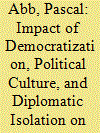| Srl | Item |
| 1 |
ID:
152060


|
|
|
|
|
| Summary/Abstract |
The June 13, 2016, ministerial meeting of the Preparatory Commission of the Comprehensive Test-Ban Treaty Organization marked the twentieth anniversary of the signing of the treaty and the establishment of the commission. The ministerial sent a strong signal of political support for and commitment to the treaty. Ministers noted with appreciation the organization's achievements related to the detection and deterrence of nuclear-test explosions while also regretting the delay in ratification by the Annex II states. The ministerial emphasized, as the key parameters of the future strategy, the importance of a multilayered approach, including the importance of track-two diplomacy and the use of communication technology that did not exist twenty years ago.
|
|
|
|
|
|
|
|
|
|
|
|
|
|
|
|
| 2 |
ID:
158498


|
|
|
|
|
| Summary/Abstract |
Taiwan’s landscape of think tanks, despite having emerged during a time of Leninist one-party governance and state-led economic development not unlike that in Mainland China, is today marked by a substantial agency in conducting both research and advocacy. This sets them apart from their counterparts on the mainland. We ask how this development was shaped by Taiwan’s evolution as a political entity, especially its experience of gradual political liberalization and eventual full democratization by the mid-1990s. In its wake, multiparty competition, factionalism, the emergence of a vigorous civil society, and individual interest groups created an environment in which think-tank services were sought by many competing actors, offering a wide array of funding opportunities for policy research. Additionally, a political culture that stresses expertise and the need to conduct unofficial diplomacy often gave think tanks a privileged position within the system, and they served as key agents in conducting the kind of informal diplomacy made necessary by Taiwan’s loss of diplomatic recognition from the 1970s onwards.
We further offer an overview of Taiwan’s think-tank landscape, describing major groups (or types) of institutes and briefly portraying especially prominent cases within them. Finally, we provide two detailed case studies to show how these institutes operate in practice, and how the need for unofficial diplomacy and a recent government change have shaped their activities.
|
|
|
|
|
|
|
|
|
|
|
|
|
|
|
|